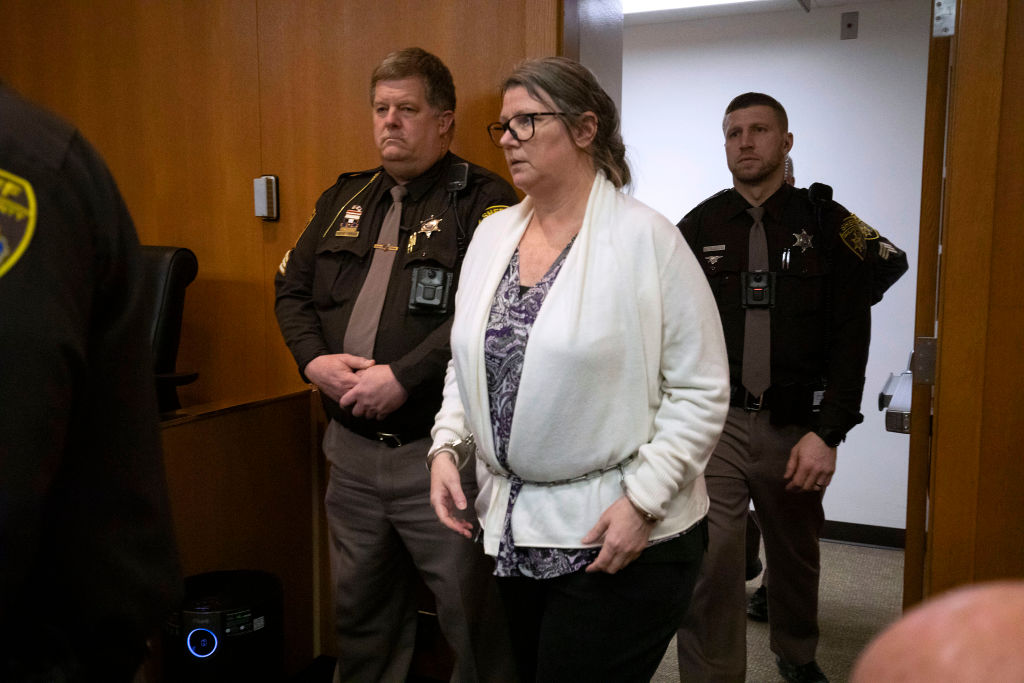
On Feb. 6, Jennifer Crumbley was convicted on four counts of involuntary manslaughter, one for each of the Michigan high school students her son murdered in 2021. Prosecutors presented her as a negligent mother, so distracted by her horses and an extramarital affair that she had ignored glaring signs of her teenager’s mental distress. That she had taken him to a shooting range only a few days before he turned his new gun on his classmates didn’t help her case. “Jennifer Crumbley didn’t pull the trigger that day,” declared prosecutor Marc Keast. “But she is responsible for those deaths.”
Crumbley’s case is just one of several in recent years that have produced convictions of parents after their children threatened or committed gun violence. Given the prevalence of mass shootings by youths—two of the suspects in the shooting that marred the Kansas City Chiefs Super Bowl parade are juveniles, police have said—police and prosecutors, desperate to prevent further carnage, will be tempted to push for new measures holding parents accountable for their children’s sins. But history shows that such statutes rarely achieve what legislators hope they will. Punishing parents is no deterrent to juvenile crime.
Americans have long tried to hold parents responsible for their children’s misdeeds. Coloradans passed the first “punish the parents” law in 1903, reasoning that parents had an obligation to keep their children out of trouble. “What could be simpler than to make this moral duty of parents a legal responsibility, punishable by fine or imprisonment?” asked Colorado juvenile court judge Ben Lindsey in 1906.
When anxieties about juvenile delinquency spiked in the late 1940s and 1950s, support for parental responsibility laws really took off. At PTA meetings, juvenile court proceedings, and congressional hearings, experts testified that “there are no delinquent children, only delinquent parents.” Police officers campaigned for parental responsibility laws, even pressing cities to establish Delinquent Parent Courts. In 1956, no less than FBI Director J. Edgar Hoover promised in Newsweek that such laws would meaningfully reduce juvenile crime. Policymakers took note.
Read More: Parents of School Shooters Rarely Are Held Responsible. This Case Is Different
Throughout the late 1940s and 1950s, communities across the nation routinely passed laws punishing parents for their children’s misdeeds. Penalties varied as widely as the crimes, from $25 fines to years in prison. The laws themselves could be shockingly broad: one 1948 Louisiana statute penalized parents for enticing, aiding, or permitting a minor to perform an “immoral act.”
These laws provoked debate almost immediately. In 1947, after weeks of sleeping outdoors, 14-year-old Frankie Rivera stole a gun and shot three passersby. A judge sentenced his obviously troubled mother to prison for a year for failing in the “sacred privilege of being a mother” and “developing in him a pattern of delinquent behavior.”
A firestorm of controversy followed. The Welfare Council of New York City and the Salvation Army denounced the sentence as disproportionate to the crime. The Society for the Prevention of Cruelty to Children called the case “outrageous” and arranged for an appeal. Meanwhile, judges and cops cheered. “I hope the police will arrest more such parents,” declared Domestic Relations Court chief John Warren. Police Commissioner Arthur W. Wallander described the case as a “ray of hope” and predicted “a salutary effect on parents and guardians.”
Debates surrounding “punish the parents” laws spread beyond the Rivera incident. A 1957 survey asked Chicago adults from a wide range of income and education levels whether parents should be liable for their children’s crimes. Nine out of 10 maintained that parents should be held at least partially responsible. Support for parental punishment laws crisscrossed racial and geographic lines, too.
But social workers and child welfare advocates countered that the laws would knock unstable families further off balance, ultimately aggravating, rather than preventing, youth crime. As New York City Children’s Court attorney and psychologist Harriet Goldberg wrote in 1948, parents of troubled children were usually troubled themselves, “more sinned against than sinning.” Goldberg and other reformers argued they needed counseling, parenting education courses, and other support, not fines and jail time. Nevertheless, by 1961, 48 out of 50 states had parental responsibility laws on the books.
Yet the laws didn’t actually deter crime. Juvenile vandalism peaked after parental responsibility laws for vandalism were widely enacted in the 1950s and early 1960s. By 1965, minors made up the majority of those arrested for major crimes against property. Nor were prosecutors eager to enforce the laws they’d so vigorously championed. Statutes didn’t discriminate between parents who let their kids run wild and those who had tried but failed to control their children, and lawyers hesitated to bring diligent parents to court. As early as the 1970s, wrote legal scholar EllenMarie Shong, it had become clear that parental responsibility statutes were mostly a “farce.”
Even so, interest in parental responsibility laws continued to swell when juvenile crime surged. More “punish the parent” laws were passed in the 1970s, thanks to “get-tough, chase-‘em-off-the-streets” politicians and citizens unnerved by the era’s violence. Whereas parental responsibility laws in the 1940s and 1950s had targeted Italians and other European immigrants, this later wave of legislation was aimed at low-income African Americans. Newspaper columnists and policymakers insisted the statutes would promote “Black self-discipline” and pushed for new curfew laws for urban teens, which parents who worked nights found difficult to enforce in the summer heat.
In the late 1980s and early 1990s, there was another rush to pass and enforce parental responsibility laws as states and cities struggled with rising street crime. In 1995 alone, 10 states enacted them, cheered on by politicians from both parties. But the laws were "country club criminology,” snorted National Council on Crime and Delinquency president Barry Krisberg. “It sounds good in the suburbs but… if you carry it out you just further endanger and pull apart families.” As a result, prosecutors mostly used the laws to pressure parents into drug treatment programs and parenting courses.
Read More: Michigan School Shooter’s Mother Jennifer Crumbley Found Guilty of Manslaughter
And despite their popularity, many lawyers contended that “punish the parent laws,” violated a fundamental principle of common law: that one person cannot be punished for the acts of another. The imprecise language of these statutes invited legal challenges. After California passed the Parental Responsibility Law in 1988, for example, the American Civil Liberties Union challenged its constitutionality on the grounds that it was vague, overbroad, and an infringement on family privacy.
Opponents also began to protest racially-biased enforcement. In 1989, California attempted to prosecute Gloria Williams for failing to exercise reasonable “care, supervision, protection and control” of her teenage son, who had been arrested for gang rape. Furious debate erupted in the op-ed pages. Conservatives crowed that Williams had gotten what she deserved. Civil rights groups agreed with Williams’ attorney when he declared she had been arrested “because she’s Black and she’s in a certain low-income bracket…Because law enforcement has not been able to solve the gang problem…they are shifting the blame onto parents.”
Even as “punish the parent” laws have been on the books for more than a century, essential questions remain unresolved: When children who become criminals grow up in violent communities, who is really to blame for their actions? At what age are people ultimately responsible for their own behavior? How much control can a parent reasonably exercise over a teenager, especially an older one?

The biggest problem with such laws, however, is that they have never been proven to prevent crime. Yet they’ve remained popular and politically convenient. Blaming individual parents for children’s crimes lets communities ignore more difficult and divisive tasks: eliminating poverty, curbing child abuse, providing mental health care, and limiting children’s access to guns.
It’s tempting to hang the horrors of the 2021 Oxford High shooting on Crumbley’s refusal to see a child descending into madness. But as Americans lean on parental responsibility laws to prevent crime and exact retribution, they should be careful that they aren't letting the broader community off too easy. In a nation where mass shootings take place with sickening regularity, perhaps Americans need to stop pointing fingers at parents, and do the hard work of eliminating the weapons that their children wield.
Victoria Cain is associate professor of history at Northeastern University. Her books include Schools and Screens: A Watchful History and (with Karen Rader) Life on Display: Revolutionizing Museums of Science and Nature in the United States. She is working on a book about adolescent privacy.
Made by History takes readers beyond the headlines with articles written and edited by professional historians. Learn more about Made by History at TIME here. Opinions expressed do not necessarily reflect the views of TIME editors.
More Must-Reads from TIME
- Cybersecurity Experts Are Sounding the Alarm on DOGE
- Meet the 2025 Women of the Year
- The Harsh Truth About Disability Inclusion
- Why Do More Young Adults Have Cancer?
- Colman Domingo Leads With Radical Love
- How to Get Better at Doing Things Alone
- Michelle Zauner Stares Down the Darkness
Write to Victoria Cain / Made by History at madebyhistory@time.com
